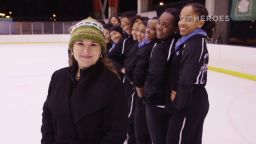Story highlights
Serious figure skaters face huge costs, making pursuit of the sport unattainable for many girls
Sharon Cohen's nonprofit gives girls from low-income communities lessons, equipment, and tutoring
Figure Skating in Harlem participants must maintain a B+ average in school
Do you know a hero? Nominations are open for 2014 CNN Heroes
Every four years during the Winter Olympics, millions of people become armchair experts on figure skating: quadruple jumps and combination spins, death spirals and triple Salchows.
And like clockwork, many rinks across the United States see a surge in enrollment for figure skating lessons inspired by Olympic fever. But the costs of seriously pursuing the sport put it out of reach for many families. Skates alone often cost $300, to say nothing of the ice time, coaching and costumes.
Yet each week in Harlem, Sharon Cohen helps more than 170 girls hit the ice and skate their way to new heights.
“The girls really fall in love with gliding, like I did, and realize that they’re doing something very special,” said Cohen, a former competitive skater who began teaching girls to skate in 1990.

“Before, there weren’t a lot of girls (here) that could imagine themselves as figure skaters. … But the thing about skating is it lets you imagine you can be anything.”
Since 1997, Cohen’s nonprofit, Figure Skating in Harlem, has provided skating equipment and instruction, tutoring and life skills classes to more than 700 girls from low-income communities.
Lessons for life
Each week, the girls participate in two 90-minute group skating classes organized by age and skill level. They have fun, get fit and stay safe after school, and Cohen believes the lessons they’re learning can last a lifetime.
“They gain discipline, perseverance. They fall down, and they get back up,” said Cohen, 48 “And they learn they can do that in anything.”
To hit the ice, students must attend tutoring sessions three times a week. Participants are required to maintain a B+ average; those struggling to do that receive extra help with their studies. The organization says more than one-third of the girls earn straight As.
“We really make them understand that we want (them) to be smart and wise and intelligent young women. And the fact that you skate is the bonus,” Cohen said. “We’re creating a culture of success.”
Success beyond skating
All of the students who’ve stayed with the program have graduated high school. In contrast, the average graduation rate in Harlem is 61%. Since 2007, all of the program’s graduates have continued on to college.
“We want girls to believe and know they can be anything they want to be if they put their hearts and minds to it,” Cohen said.
Kolby Couch joined the group as a first-grader eight years ago. She dreams of becoming an astronomer, but she hit a bump last year when she failed algebra.
“Miss Sharon hired a special tutor for me,” said Couch, 14. “Now I’m doing way better in school. … She is teaching us to be the best we can be in life.”
Do you know a hero? Nominations are open for 2014 CNN Heroes
Students pay $350 a year to participate in Cohen’s program. But with up to 100 girls on the waiting list, Cohen says this helps ensure that the girls are committed to it. One-third of the students get scholarship assistance, and Cohen says that no one is ever turned away because she cannot pay.
Breaking barriers
The group recently began competing in team synchronized skating competitions throughout the Northeast.
“They’re up against teams (where) girls skate every day and have private lessons,” Cohen said. “So the fact that they’re even in contention is an amazing achievement.”
It’s hard work – because of limited ice time, the group’s senior team practices at 6 a.m. on Sundays – but training as a team gives the girls valuable experience. And their presence in competitions adds a dose of diversity to the sport.
“They’re the only all-minority – Latino, African-American – team out there,” Cohen said. “They’re very proud, and they’re very well-received.”
Cohen hopes to one day build an ice skating education center in Harlem so that more girls can participate. She’s also working to bring her program to underserved communities in Chicago, Detroit and Los Angeles.
“When kids are given a blank sheet of ice, they can grow and achieve their personal best,” Cohen said. “That’s what this is about – giving them the opportunity to find out what they’re made of.”
Want to get involved? Check out the Figure Skating in Harlem website at www.figureskatinginharlem.org and see how to help.





